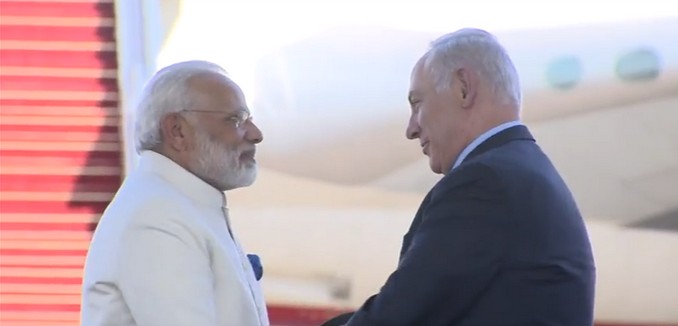Indian Prime Minister Narendra Modi on Tuesday kicked off his three-day trip to Israel, the first-ever by an Indian head of government.
Israeli Prime Minister Benjamin Netanyahu, who described the visit as “historic,” will accompany Modi throughout almost the entire trip, an honor generally reserved for American presidents.
Modi on Wednesday extended Netanyahu an invitation to visit India, which Netanyahu immediately accepted. The visit is expected to take place later this year.
The two leaders signed a number of bilateral agreements governing satellite technology, water, and agriculture. They also discussed establishing a $40 million fund to encourage technological innovation.
So far, Modi had a flower named for him at the Danziger Flower Farm, visited Mt. Herzl and Yad Vashem, greeted Israeli President Reuven Rivlin, and met with Moshe Holtzberg, whose parents were killed in a 2008 terror attack on a Jewish center in Mumbai.
Video: PM Netanyahu and @PMOIndia @NarendraModi, meet Moshe Holtzberg, whose parents were murdered in the 2008 terrorist attack in Mumbai. pic.twitter.com/UOXgdHH01R
— PM of Israel (@IsraeliPM) July 5, 2017
Modi will not visit the Palestinian Authority during this Middle East visit, an unusual step for the leader of a nation with warm ties to the Arab world. Modi’s government stated that skipping the PA was a way to “de-hyphenate” its relationship with Jerusalem and Ramallah.
In welcoming Modi on Tuesday, Netanyahu said that after waiting 70 years for Israel to receive an Indian head of state, “We receive you with open arms.”
Netanyahu added, “We love India. We admire your culture, we admire your history, your democracy, your commitment to progress. We view you as kindred spirits in our common quest to provide a better future for our peoples and for our world.”
Netanyahu recalled that when the two leaders met at the United Nations in 2014, Modi said that “the sky’s the limit” for ties between Israel and India.
In a Facebook post Tuesday, Modi expressed his enthusiasm about his trip to Israel.
“I will have in-depth talks with Prime Minister Netanyahu on the full spectrum of our partnership and strengthening it in diverse fields for mutual benefit,” Modi wrote. “We will also have the chance to discuss major common challenges like terrorism.”
Modi also wrote of his plans to meet “with leading Indian and Israeli CEOs and start-ups to discuss our shared priority of expanding business and investment collaboration on the ground.”
Modi and Netanyahu co-authored a road map of how they envisioned the nature of future bilateral relations between their nations, which was published Monday in The Times of India.
Referring to the alliance as a “natural partnership,” they called their countries “two modern, vibrant democracies that draw on our rich historical traditions while striving to seize the promise of the future for our peoples.”
“India is a growing economic powerhouse with a large market and talent pool. Israel is a world leader in high technology and innovation,” Modi and Netanyahu wrote, observing that the combination of these factors could lead to “more effective and more affordable solutions for us in diverse fields that are priorities for both our governments: agriculture, water, health, environment, education and security.”
Writing in The American Interest, historian Walter Russell Mead observed that the growing ties between Israel and India reflect “the successful expansion of Israeli diplomacy away from Europe. From the Gulf to Africa to all across Asia, Israeli diplomacy is more active and diversified than ever before.”
[Photo: IsraeliPM / YouTube ]




